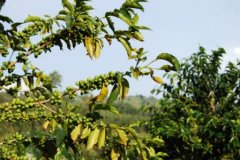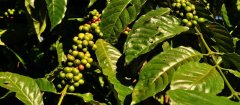Introduction to the flavor of Kenyan coffee
Introduction Editor
Kenyan coffee
Kenyan coffee
Kenya's northern neighbor is Ethiopia, where the Arabica coffee tree originated, but it was not until the early twentieth century that coffee cultivation began. In the 19th century, missionaries introduced Arabica trees from Yemen, but did not plant them in large quantities. It was not until 1893 that they introduced the ancient Brazilian bourbon coffee seeds to cultivate coffee on a large scale. In other words, Kenyan coffee has Brazilian ancestry. Due to differences in water, climate and processing methods, Kenyan beans have a completely different flavor from Brazilian beans. Brazilian coffee is grown at low altitudes, with soft texture and no obvious fruit acid flavor. Kenyan coffee trees, on the other hand, are concentrated on the slopes near Mount Kenya, between 4,000 feet and 6,500 feet above sea level, which is suitable for coffee bean flavor development, because the mountain temperature is lower, the growth is slower, the aroma of coffee beans is fully developed, the fruit acid flavor is more obvious, and the texture is harder. In addition, Kenya was a British colony in the early days, and the British have established a complete system of cultivation and quality control. After Kenya became independent, the coffee industry was on an established basis.
There are two types of coffee farms in Kenya. One is a large plantation covering more than five acres, but the average elevation is lower. For Kenya coffee, the coffee beans of the large farm are only moderate in quality. The best Kenyan beans are produced in small farms, mostly located in the foothills or hillsides above 5,000 or 6,000 feet. Each small farmer can only produce about 20 to 70 bags per season. They cannot afford to invest in expensive washing and treatment plants. However, small farmers are very united. Hundreds or thousands of families set up cooperative farms. The washing and treatment plants are funded by the government. The coffee fruits picked by small farmers are sent to cooperative farms for unified processing. First, the half-ripe or rotten fruits are removed, and then peeled, fermented, The process of breaking down the pulp, removing the beans, drying and polishing is supervised by the official Coffee Authority, which is quite rigorous and ensures the quality of Kenyan coffee. Kenya bean washing processing technology and high standards of quality pipe, has been a model of bean producing countries.
Kenya coffee berries
Don't underestimate Kenya's small farmers. They are no different from ants and soldiers. Their overall productivity is higher than that of large farms, about six to four, which is quite rare in soybean producing countries. Kenyan coffee is widely appreciated by connoisseurs, thanks in large part to smallholder farmers who work hard to grow good coffee in the foothills. In addition, Kenya beans must have a strict classification system, washing plant coffee beans, according to size, shape and hardness, divided into five grades, the highest level is PB, followed by AA++, AA+, AB. This grading system is similar to Colombia, mainly based on particle size and shape considerations, but good selling is not good flavor. This is what coffee fans should know. The current international evaluation of Kenyan beans is not as good as in previous years. I believe this is related to the abnormal climate and unfavorable coffee growth, but things are not so simple. This is related to the Kenyan authorities 'efforts to promote a new variety, Ruiru11, which has stronger disease resistance and higher unit yield. The taste test results show that the new variety with higher economic value has worse flavor than the traditional variety. Worse, Ruiru11 is about to replace the traditional Arabica and Bourbon varieties. In addition, the decline in coffee quality, auction prices are not good, small farmers 'income is reduced, coupled with the coffee management bureau people do not plan, farmers' enthusiasm for coffee greatly reduced, of course will affect the quality. Moreover, Kenya's excellent washing technology has also deteriorated, which is a killer of quality.
In addition, Kenya was a British colony in the early days, and the British have established a complete system of cultivation and quality control. After Kenya became independent, the coffee industry made great strides on the existing basis and became Kenya's foreign exchange earning industry.

Important Notice :
前街咖啡 FrontStreet Coffee has moved to new addredd:
FrontStreet Coffee Address: 315,Donghua East Road,GuangZhou
Tel:020 38364473
- Prev

Asian beans, Sumatra, Manning, Indonesia, Lin Dong Manning Coffee, cooked beans, single coffee.
The most famous coffee producers in Asia are the islands of Malaysia: Sumatra, Java and Kaliman. Sumatra Manning coffee from the Indonesian island of Sumatra is the most famous. Mantenin coffee is produced in Lake dopa in Sumatra Province and Lake Tawa in Aceh. This is the famous Shuangman of the two lakes. What Shuangman of the two lakes have in common is that they are both very thick.
- Next

Papua New Guinea Kimmel Manor Dou Island Coffee PNG Fine Coffee
Washed Papua New Guinea coffee always has a brighter, more sour performance, similar to the flavor of Central American coffee. Large estates / farms (plantation) usually have their own washing plants, and smaller individual coffee farmers are more likely to control the quality and flavor of their output. Located in the Wiki Valley of the western plateau of Papua New Guinea, near Qimai in the kimel Valley.
Related
- Does Rose Summer choose Blue, Green or Red? Detailed explanation of Rose Summer Coffee plots and Classification in Panamanian Jade Manor
- What is the difference between the origin, producing area, processing plant, cooperative and manor of coffee beans?
- How fine does the espresso powder fit? how to grind the espresso?
- Sca coffee roasting degree color card coffee roasting degree 8 roasting color values what do you mean?
- The practice of lattes: how to make lattes at home
- Introduction to Indonesian Fine Coffee beans-- Java Coffee producing area of Indonesian Arabica Coffee
- How much will the flavor of light and medium roasted rose summer be expressed? What baking level is rose summer suitable for?
- Introduction to the characteristics of washing, sun-drying or wet-planing coffee commonly used in Mantenin, Indonesia
- Price characteristics of Arabica Coffee Bean Starbucks introduction to Manning Coffee Bean Taste producing area Variety Manor
- What is the authentic Yega flavor? What are the flavor characteristics of the really excellent Yejasuffi coffee beans?

